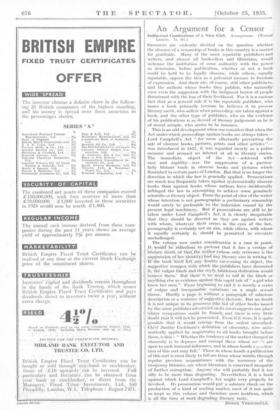An Argument for a Censor
Indiscreet Confessions of a Nice Girl. Anonymous. (Werner Laurie. 7s. 6d.) OPINIONS are violently divided on the question whether the absence of a censorship of books in this country is a matter for gratitude. Many of the most reputable publishers and writers, and almost all booksellers add librarians, would welcome the institution of smile authority with the power to determine, before publication, whether or not a book could be held to be legally obscene, while others, equally reputable, oppose the idea as a potential menace to freedom of expression. And there arc, of course, still other publishers, and the authors whose books they publish, who naturally view even the suggestion with the indignant horror of people hreatened with the loss of their livelihood. For it is a curious fact- that as a general rule it is the reputable publisher, who issues a book primarily because he believes it to possess literary merit, who suffers when proceeding; are taken against a book, and the other type of publisher, who on the evidence of his publications is as devoid of literary judgement as he is of moral scruple, who seems to be immune.
This is an odd development when one considers that when the Act under which proceedings against books are always taken— Lord Campbell's Act " for more effectually preventing the sale of obscene books, pictures, prints and other articles "— Was introduced in 1857, it was regarded merely as a police measure and aroused no interest at all in literary circles. The immediate object of the Act— achieved with case and rapidity—was the suppression of a particu- larly blatant trade in obscene books and pictures which flourished in certain parts of London. But that is no longer the direction in which the law is generally applied. Prosecutions are much less frequently taken against systematically obscene books than against books whose authors have .incidentally infringed the law in attempting to achieve some genuinely scientific or literary object. From the point of view of the writer whose intention is not pornographic a preliminary censorship would surely be preferable 'to the indeeisidn caused by the present legal machinery. But if prosecutions are still to...be taken under Lord Campbell's Act, it is clearly inequitable that they should be directed as they arc against writers with whom, whatever their errors in the eyes of the law, pornography is certainly not an aim, while others, with whom it equally certainly is, should be permitted to circulate unchallenged.
The volume .now.. under consideration is a ease in point. It *Mild' be ridieniong to: pretend that it has a vestige of `literary riferit; of that'Aie author .(whose only reticence is the suppression of. her identity) bact ans., literary aim in writing it II" bdek •itself left-aiiy doubts cot corning its object, the suggestive vvrapper with which the publishers have decorated it, the vulgar blurb and the-coyly lubricious-dedication would remove them. But -there' is 'no' need to' salt ifi the blurb or anything else as evidence against this vapid. tale 'of " a girl who kneW her men." FroM beginning to end it is merely a series of vulgar and irresponsible variations' on a single sexual theine. Hardly a page is withoirt a paragraph of' salacious description or a sentence of suggestive rhetoric. But Ito doubt it is not unique in its grossness '(the list of other books issued by the same publisher advertised on its cover suggests One place ..whigre companions could be found), and there 'is very little idtiat thikt it not be Prosecuted. 1:vet-in:It Were, it is quite ::posslibie :that it wbuldlernerge frdm the ordeal unscathed. !Chi'sf Stistide •Coakburn'S• delinithin of - obscenity, • now auto- matically applied by magistrates to all books brought before them, is Ws " Whether the tendency of the matter charged as obscenity is to deprave and corrupt those whose mi s are open to such immoral influences, and in whose hands a publica- tion of this sort may fall." Those in whose hands a publication of this sort is most likely to fall are those whose minds, through regular previous acquaintance • with the resources of the twopenny libraries, are where literature is concerned incapable of' further corruption. Anyone else will probably find it too silly to be 'more than disgusting. Nevertheless it is a book against which Lord Campbell's Act might, very properly be invoked. Its prosecution would put a salutary cheek on the production of a kind of reading matter, most of it not quite so inept as this volume and therefore more insidious, which is all the time at workdegrading literary taste. - . .
DilitEE V ERSCHOYLE.:


























































 Previous page
Previous page